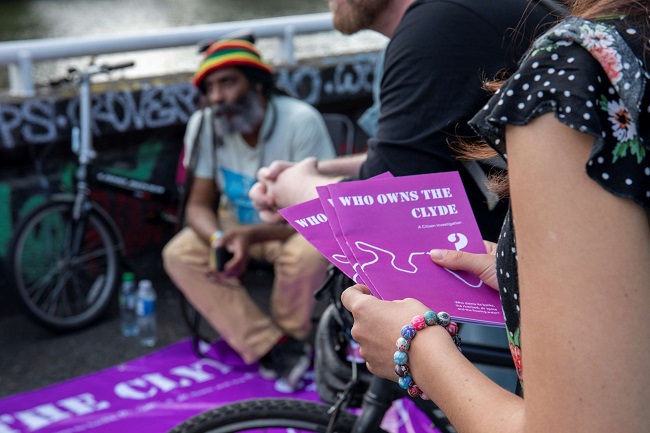New podcast investigates who owns the river Clyde and why this matters to the people of Glasgow
Published: 14 August 2024
“Who owns the Clyde” – a podcast series produced and hosted by crime writer & UofG's Professor Louise Welsh and architect Jude Barber ‒ has been launched.

“Who owns the Clyde” – a podcast series produced and hosted by crime writer & UofG's Professor Louise Welsh and architect Jude Barber ‒ has been launched.
The three-part investigation explores how complexities around ownership of the Clyde impact Glasgow’s historic waterfront. It asks what this means for the river’s future and how the Clyde could be reclaimed and reimagined for the benefit of citizens and visitors.
Welsh and Barber have collaborated since 2014 on a project called The Empire Café, which creates opportunities for conversations about history, land ownership and the ongoing effects of Empire. Welsh says: “Jude and I both have a lot of curiosity about subjects that affect us yet we aren’t experts in. We believe other people do too, and The Empire Café was founded to bring those minds and voices together as citizen investigators.”
For “Who Owns the Clyde”, the contributors include local politicians and activists as well as Clydeside residents and workers. Created in association with podcast producer Halina Rifai, each episode offers a rich kaleidoscope of voices, music and soundscapes.
Episode one delves into the history of the Clyde and how it was fundamental to Glasgow’s evolution and development as a trading and industrial city. Guests include leader of Glasgow City Council Susan Aitken, councillor Graham Campbell and land reformer Andy Wightman.
Contrasting the current lack of activity on and around the river with its bustling, cosmopolitan past, Welsh, Barber and their guests consider how the Clyde could be reinvigorated. They ask how the fragmented and opaque ownership of the land around the Clyde stands in the way of productive and socially sustainable development. And they share local people’s hopes and dreams for the river – from uninterrupted walking routes and water buses to paddleboarding and community spaces.
Episode two examines the murky issue of river ownership. It explores how the privatisation of formerly public assets has created a disconnection between the priorities of the owners and the interests of local people. Contributors include Paul Sweeney MSP, former MSP Sandra Whyte and Robert Buirds from the Campaign to Save Inchgreen Dry Dock.
The guests reflect on the Clyde’s potential as a community asset and a valuable piece of sustainable infrastructure – supporting biodiversity as well as providing a low-carbon transport route and green energy. But they also tackle the thorny issue of how to make things happen in the face of fragmented ownership. This challenge will be investigated further in episode three, which is in production and due to be issued in September. Welsh and Barber invite listeners to contribute their own thoughts and ideas, so these might be included in the third episode and beyond.
Designed to appeal to a broad audience, the richly textured podcast’s dialogue is interwoven with music by artist Graham Fagen with reggae artist Ghetto Priest and also students of the Royal Conservatoire of Scotland. It also includes readings by poets Malika Booker and Jim Carruth.
While “Who Owns the Clyde” has a very local focus, it asks questions that are relevant to post-industrial cities across the UK and further afield. Barber says: “From opaque land ownership to an increasing trend towards privately owned public spaces (POPS), the podcast raises issues that concern us all. We hope that its reach will extend beyond communities on the Clyde and encourage more creative conversations ‒ and actions ‒ that explore new, sustainable uses for our rivers in post-industrial cities.”
Who owns the Clyde Podcast
The podcast is available on Spotify.
The Empire Café
The Empire Café was established by writer Louise Welsh and architect Jude Barber of Collective Architecture during the 2014 Commonwealth Games. Its projects include soundscape Merchant City Voices, The Empire Café cultural event and podcast Who Owns the Clyde. Its activities encourage conversations about history, land ownership and the ongoing effects of Empire through cross-cultural events, writing, visual arts, public discussions, sound-based works and more.
Louise Welsh
Louise Welsh is the author of 10 novels including The Cutting Room, The Plague Times trilogy and To the Dogs. As well as co-directing The Empire Café with Jude Barber, she also has a 10-year practice in opera with composer Stuart MacRae. She has received many awards and international fellowships, including honorary doctorates from Napier University and the Open University.
Louise is Professor of Creative Writing at the University of Glasgow and a Fellow of the Royal Society of Edinburgh and the Royal Society of Literature.
Jude Barber
Jude Barber is an architect and director at Collective Architecture, an employee-owned practice with studios in Glasgow, Edinburgh and Dundee. With colleagues, she has delivered a range of award-winning residential, strategic and cultural projects across Scotland.
In parallel with her studio practice at Collective, Jude undertakes creative collaborations with writer Louise Welsh and co-runs Voices of Experience with Suzanne Ewing and Nicola McLachlan.
Jude is a Fellow of the Royal Society of Edinburgh, an Academician (Elect) of the RSA and Chair of Glasgow Women’s Library.
Halina Rifai
Halina Rifai is a podcast producer, music writer and communications manager with 20 years’ experience in industries including telecommunications, recruitment and music.
As a podcast producer, she has worked on projects with organisations including The Big Light, The Ferret, Culture Collective, Mental Health Foundation, BBC Scotland, Glasgow Short Film Festival, Fringe of Colour, Scottish Women in Music, Dardishi and Shubbak.
Halina regularly contributes to BBC Radio Scotland as a reviewer and talking head. She has also guested on STV as a talking head looking at media and topical issues.
First published: 14 August 2024

